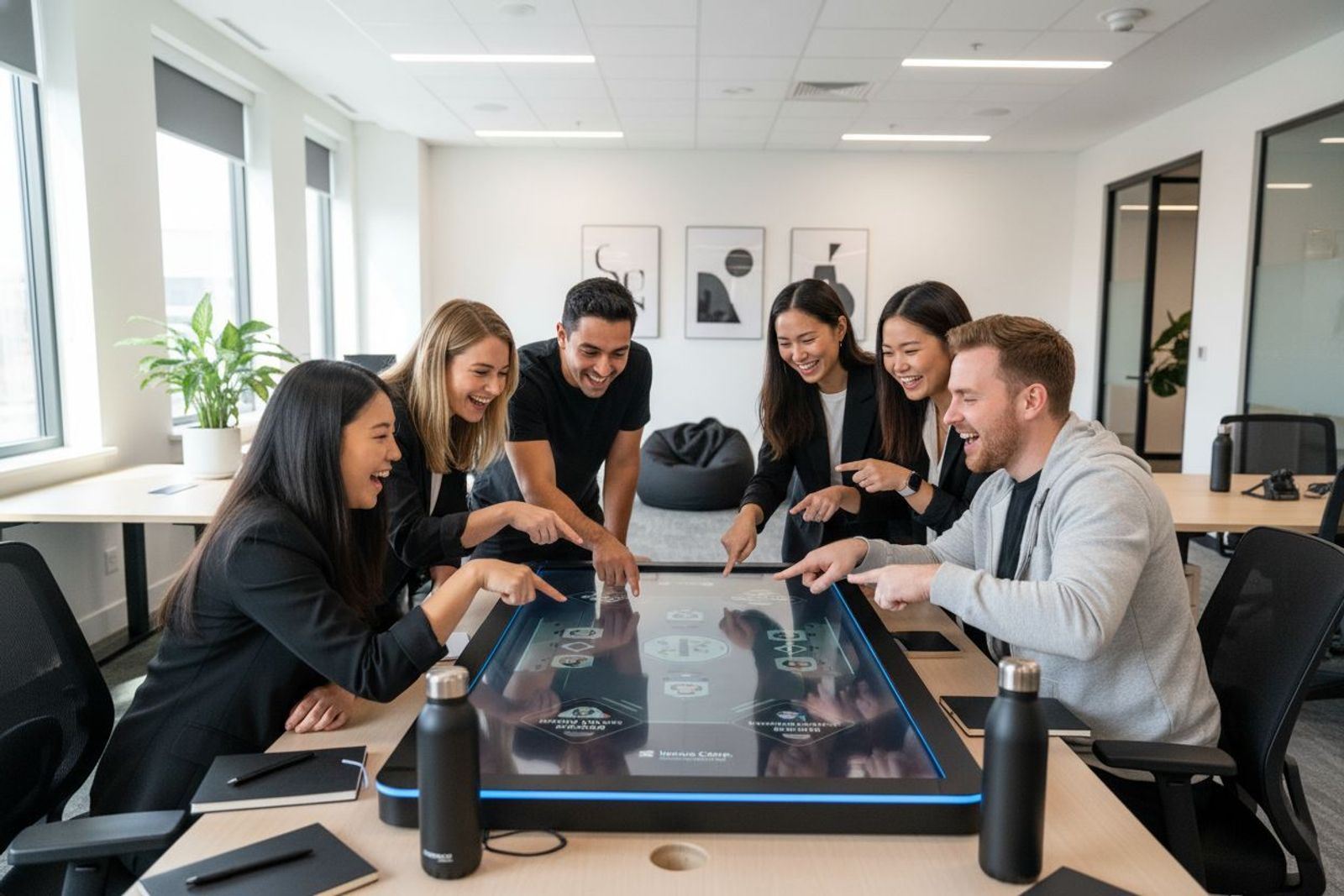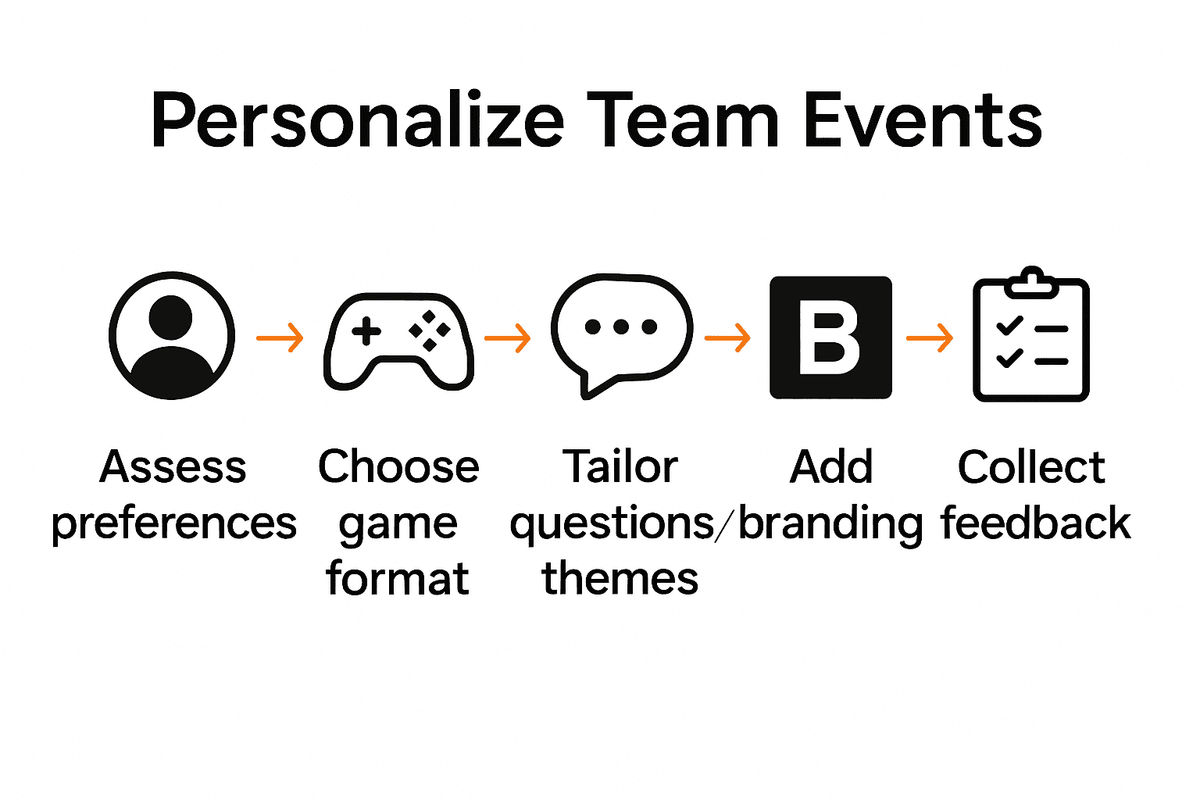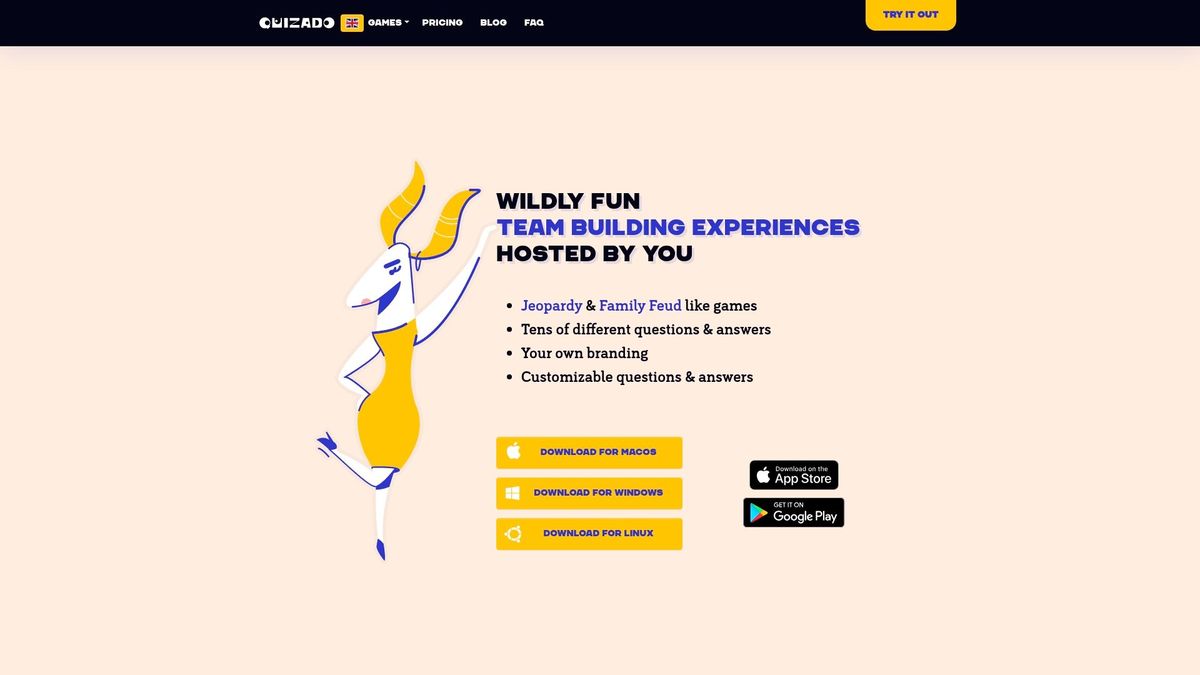Professional Bar Trivia SoftwareFor Venues & Events
- Players join via QR code — no app download
- 6 round types: Buzzer Race, Everyone Answers & more
- Rich media questions with images, video & audio
- Real-time scoring & leaderboards on the big screen
How to Personalize Team Events for Engaged Collaboration
October 20, 2025

Did you know that tailored team-building events can drive a remarkable 20 percent increase in project efficiency for leading companies? Understanding your team's unique strengths, styles, and shared values lays the foundation for collaboration that sticks. When team events reflect real personalities and organizational culture, the results go far beyond surface-level fun and lead to measurable growth and meaningful connection.
Quick Summary
| Key Point | Explanation |
|---|---|
| 1. Conduct Personality Assessments | Use frameworks like MBTI or DISC to identify team dynamics and preferences for effective collaboration. |
| 2. Match Game Formats to Insights | Select engaging game formats that align with your team's strengths and problem-solving styles for maximum impact. |
| 3. Create Tailored Themes and Questions | Develop personalized game content that reflects your team's culture and recent achievements for deeper engagement. |
| 4. Integrate Corporate Branding | Seamlessly embed your company’s visual identity into events to enhance the experience and reinforce brand connection. |
| 5. Gather Feedback for Continuous Improvement | Utilize pre and post-event surveys to assess effectiveness and refine future team experiences for sustained growth. |
Table of Contents
- Step 1: Assess Team Preferences And Objectives
- Step 2: Select And Configure Customizable Game Formats
- Step 3: Create Tailored Questions And Themes
- Step 4: Integrate Corporate Branding And Visuals
- Step 5: Test And Refine Your Event Experience
Step 1: Assess Team Preferences and Objectives
Successful team events start with understanding who your team members truly are. This step involves uncovering individual preferences, communication styles, and underlying motivations that will shape a truly engaging collaborative experience.
Begin by conducting a thoughtful personality assessment using established frameworks like MBTI or DISC. These tools provide profound insights into how team members think, interact, and approach challenges. According to research from personos.ai, companies like IBM have seen a remarkable 20% boost in project efficiency when leveraging personality insights.
Approach the assessment process with sensitivity. Create a safe, optional environment where team members can share their results voluntarily. Focus on building understanding rather than categorizing people.
 The goal is to recognize diverse strengths and communication preferences that can transform how your team collaborates.
The goal is to recognize diverse strengths and communication preferences that can transform how your team collaborates.
Pro Tip: When reviewing personality assessments, emphasize that these are descriptive tools, not definitive labels. Encourage open dialogue about individual work styles and preferences.
Consider tracking key insights such as:
Here's a summary of popular assessment frameworks and their key benefits:
| Framework | Focus Area | Key Insights Provided |
|---|---|---|
| MBTI | Personality Type | How team members think Interaction preferences |
| DISC | Communication Style | Collaboration approaches Response to challenges |
| StrengthsFinder | Individual Strengths | Standout talents Motivation triggers |
| Enneagram | Motivation & Stress | Core drivers Stress response patterns |
- Communication preferences (direct vs collaborative)
- Problem solving approaches
- Energy management (introverted vs extroverted tendencies)
- Motivation triggers
- Stress response patterns
Teams that understand these nuanced dynamics can design events that truly resonate. According to assessTM, personality assessments help reduce team conflict by promoting self awareness and empathy—critical foundations for any successful team building initiative.
With these insights gathered, you are now ready to move into designing a personalized team event that speaks directly to your team's unique composition and collaborative potential.
Step 2: Select and Configure Customizable Game Formats
Now that you understand your team's unique dynamics, it is time to transform those insights into an engaging game format that sparks collaboration and excitement. This step is about matching your team's personality profile with the right interactive experience.
According to event gamification experts, customizable game formats like virtual reality missions, on-site scavenger hunts, and creative challenges can dramatically boost team collaboration when designed thoughtfully. Professional team building providers understand that the magic happens when the game format aligns perfectly with your team's specific context and goals.
Start by considering your team's assessment results. Are they problem solvers who love strategic challenges? Opt for puzzle-based formats. More creative types? Choose activities that allow artistic expression. High-energy groups might prefer physical challenges, while analytical teams could enjoy knowledge-based competitions.
Pro Tip: Select a game format that simultaneously challenges and celebrates your team's unique strengths. The goal is engagement, not intimidation.
Consider game formats that offer:
- Flexibility in team size
- Multiple difficulty levels
- Opportunities for different communication styles
- Options for in-person or remote participation
As TeamBonding demonstrates, professional providers can design bespoke programs tailored precisely to your organizational objectives. Whether you want to improve communication, boost morale, or solve specific team challenges, the right game format can be a powerful tool.
With your game format selected, you are now ready to dive into the exciting world of customization and design that will transform your team event from ordinary to extraordinary.
Step 3: Create Tailored Questions and Themes
Now comes the creative heart of your team event where you will transform generic games into meaningful experiences that speak directly to your team's unique identity and objectives. This step is about crafting questions and themes that not only entertain but deeply resonate with your team's culture and aspirations.
According to dynamic event specialists, custom-made solutions allow for including branded and unique content that reflects company culture and increases engagement through personalization. Imagine questions that reference your team's recent projects, inside jokes, or specific organizational milestones.
Start by brainstorming themes that align with your team's current goals or recent achievements. Are you celebrating a successful quarter? Launching a new product? Navigating a significant organizational change? These contexts provide rich material for creating immersive and meaningful game experiences.
Pro Tip: Balance entertainment with purpose. Every question should feel like an insider conversation, not a generic trivia challenge.
Consider incorporating elements such as:
- Company history snippets
- Recent team accomplishments
- Personal anecdotes shared during earlier assessments
- Future organizational aspirations
Current event gamification trends emphasize story-driven challenges that create deeper connections. Think beyond simple questions create narrative arcs that engage participants and reinforce team identity.
The magic happens when your questions feel less like a test and more like a celebration of your team's unique journey. By weaving personal and professional narratives into your game format, you transform a simple activity into a powerful team-building experience.
With your tailored questions and themes ready, you are now prepared to bring your personalized team event to life in a way that will surprise, delight, and genuinely connect your team members.
Step 4: Integrate Corporate Branding and Visuals
This step transforms your team event from a generic game into a powerful expression of your organizational identity. By strategically embedding your corporate visual language, you create an experience that feels authentically yours and resonates deeply with team members.
According to dynamic event specialists, custom activities can embed company branding directly into game screens, challenges, and content to reinforce brand identity and strengthen engagement. Think beyond simple logo placement imagine your company colors, typography, and visual motifs woven seamlessly into every aspect of the game experience.
Start by gathering your core brand assets. Your company style guide is your blueprint. Pull together your official color palette, logo variations, preferred fonts, and any visual elements that represent your organizational culture. The goal is to create an immersive environment that feels like a natural extension of your workplace.
Pro Tip: Subtlety is key. Your branding should enhance the experience, not overwhelm it. Think of it as seasoning, not the main course.
Consider integrating branding through:
- Custom color schemes matching corporate palette
- Logo watermarks or subtle background elements
- Themed challenge screens reflecting company values
- Company mission statements as game narrative drivers
Emerging event gamification trends highlight the power of immersive technologies like AR and VR in creating memorable branded experiences. These technologies offer unprecedented opportunities to bring your company's visual identity to life in interactive, engaging ways.
The most compelling branded experiences feel organic. They do not just display your logo they tell your company's story through carefully crafted visual language. When done right, your team event becomes a celebration of shared identity and collective achievement.
With your branding now beautifully integrated, you are ready to create an event that looks, feels, and sounds unmistakably like your organization.

Step 5: Test and Refine Your Event Experience
This final step transforms your team event from a one-time activity into a strategic tool for continuous improvement. Here you will validate your design, gather meaningful insights, and create a feedback loop that elevates future team experiences.
Interactive team building experts emphasize the critical importance of measuring outcomes through pre and post event surveys and engagement analytics. Your goal is not just to host an event but to create a measurable impact that demonstrates tangible value to your organization.
Begin by designing a comprehensive feedback mechanism. Create a survey that goes beyond surface level reactions. Ask specific questions about team dynamics, individual experiences, learning moments, and potential areas of improvement. Aim for a mix of quantitative ratings and qualitative open-ended responses that provide rich, actionable insights.
Pro Tip: Anonymity encourages honest feedback. Ensure participants know their responses are confidential and will be used constructively.
Consider collecting feedback through:
- Immediate post-event digital surveys
- Follow-up email questionnaires
- Small group debriefing sessions
- Individual one-on-one conversations
According to team bonding specialists, the follow-up evaluation process is crucial for continuously improving event design. Look for patterns in the feedback that reveal:
- What worked exceptionally well
- Moments of high engagement
- Areas that felt challenging or less interesting
- Suggestions for future iterations
The most successful team events are not static experiences but dynamic, evolving interactions. By systematically collecting and analyzing feedback, you create a living, breathing team-building approach that adapts and grows with your organization.
Remember that refinement is an ongoing process. Each event becomes a learning opportunity, a chance to understand your team better and design increasingly impactful experiences that truly resonate with their unique dynamics and goals.
Bring Your Personalized Team Event Ideas to Life with Quizado
You have learned how understanding team preferences, customizing questions, and integrating your company's unique branding are crucial for creating engaging and memorable collaborative experiences. If you are ready to move beyond theory and instantly put these steps into action, see how Quizado can make it simple. Discover interactive music-themed quizzes or build an event from scratch inspired by your team’s favorite styles and motivators.

Stop struggling to build team engagement using disconnected tools. With Quizado, you can quickly craft fully personalized quiz games, add your own branding, and access a broad library of unique survey questions. Seamlessly tailor every event to your team for a truly collaborative experience. Visit Quizado now to start designing engaging, branded team events that foster real connection and teamwork.
Frequently Asked Questions
How can I assess my team's preferences for personalized events?
Start by conducting personality assessments using frameworks like MBTI or DISC to gather insights into individual preferences and communication styles. Use this information to create a safe space for team members to discuss their results and build an understanding of each other.
What game formats should I choose for an engaging team event?
Select game formats that align with your team's strengths and personality profiles. Determine whether your team enjoys problem-solving puzzles, creative challenges, or physical activities to create an engaging experience that promotes collaboration.
How do I create tailored questions for my team event?
Develop customized questions that reflect your team’s culture, recent achievements, and organizational goals. Incorporating personal anecdotes and inside jokes can make the questions feel relevant and engaging, transforming generic games into meaningful experiences.
How can I effectively integrate corporate branding into my event?
Gather your company's brand assets, such as color schemes and logos, to create a cohesive visual identity throughout the event. Ensure that your branding enhances the experience without being overwhelming, creating an immersive environment that reflects your organization’s culture.
What feedback mechanisms should I use to refine my team events?
Design comprehensive feedback mechanisms, such as post-event surveys and small group discussions, to understand participant experiences and identify areas for improvement. Collect both quantitative ratings and qualitative comments to inform future event design.
How often should I evaluate and update my team event strategies?
Evaluate your team events after each occurrence to continuously improve engagement and effectiveness. Aim to implement feedback changes within 30-60 days to ensure your events remain relevant and tailored to your team's evolving dynamics.
Recommended
What's next?
Start Hosting Bar Trivia Tonight
Try Quizado free — no download needed. Host your first trivia night tonight!

